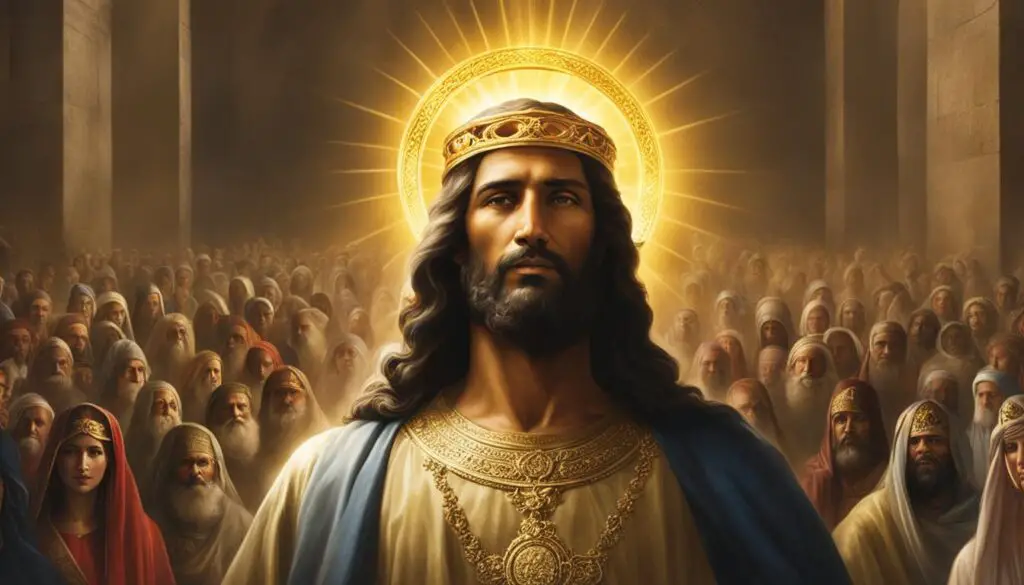Throughout history, there has been a debate surrounding the Bible’s definition of the Messiah. The term “Messiah” is derived from the Hebrew word “mashiyach,” meaning “someone who’s anointed.” In the Old Testament, anointing was often done to set individuals apart for a specific role, such as a king, priest, or prophet. While there are several references to anointed individuals in the Bible, there is no unambiguous foretelling of the coming of the Messiah. However, passages like Psalm 2 and Isaiah 53 hint at the arrival of a messianic figure who would bring peace and salvation to the world.
Key Takeaways:
- The Bible’s definition of the Messiah is derived from the Hebrew word “mashiyach,” meaning “someone who’s anointed.”
- There is no unambiguous foretelling of the coming of the Messiah in the Old Testament.
- Passages like Psalm 2 and Isaiah 53 suggest the arrival of a messianic figure who would bring peace and salvation.
The Meaning of the Word “Messiah”
The word “Messiah” is a transliteration of the Hebrew word “mashiyach” and the Greek word “christos,” both of which mean “someone who’s anointed.” Anointing in the Old Testament was used to designate kings, priests, and prophets for specific roles. While the term “Messiah” was initially associated with these anointed individuals, it eventually became a title referring to the promised messianic figure who would bring salvation and establish a new age. This concept of the Messiah is found in various biblical references, including Psalm 2 and Isaiah’s servant songs.
In Hebrew, the word “mashiyach” carries the connotation of anointing with oil, symbolizing consecration and divine appointment. The Greek word “christos” is a direct translation of “mashiyach” and also carries the same meaning of anointed or chosen one. Both words emphasize the significance of being set apart and divinely appointed for a special purpose.
“He was anointed as the chosen one, the savior who would bring forth righteousness and fulfill God’s promises.”
Throughout the Old Testament, there are numerous references to the coming of a messianic figure who would bring deliverance, justice, and restoration. These references provide glimpses into the meaning and role of the Messiah in biblical teachings. The word “Messiah” captures the essence of this promised figure, highlighting their anointed status and their mission to bring salvation to humanity.
The Promised Messiah in Biblical Verses
| Verse | Description |
|---|---|
| Psalm 2:2 | The kings of the earth set themselves against the Lord and his anointed. |
| Isaiah 53:11 | By his knowledge, my righteous servant will justify many, and he will bear their iniquities. |
| Zechariah 9:9 | Behold, your king is coming to you; righteous and having salvation is he, humble and mounted on a donkey. |
| Matthew 16:16 | Simon Peter replied, “You are the Christ, the Son of the living God.” |
In conclusion, the word “Messiah” carries rich meaning and significance in biblical teachings. It represents the anointed figure who would fulfill God’s promises, bring salvation to humanity, and establish a new age of righteousness and peace. The Hebrew and Greek origins of the word emphasize the concept of being set apart and divinely appointed. Various biblical verses provide insights into the role and characteristics of the Messiah, highlighting their humility, righteousness, and mission to bring salvation to the world.
The Historical Context
The historical context surrounding the coming of the Messiah is crucial in understanding the biblical prophecies and their fulfillment. In the Old Testament, there are hints and allusions to the Messiah’s arrival, but no explicit, direct prophecy of the coming messianic figure. However, passages like Zechariah 9:9 and Isaiah 53 provide glimpses into the characteristics and mission of the Messiah.
Zechariah 9:9 foretells the Messiah’s arrival as a righteous king riding on a donkey, symbolizing humility and peace. This verse, along with other prophecies, has been connected by scholars to the life and ministry of Jesus Christ, seeing their fulfillment in his birth, life, death, and resurrection.
“Rejoice greatly, O daughter of Zion! Shout aloud, O daughter of Jerusalem! Behold, your king is coming to you; righteous and having salvation is he, humble and mounted on a donkey, on a colt, the foal of a donkey.” – Zechariah 9:9
Isaiah 53 is another significant passage that paints a picture of the suffering servant who would bear our sins and bring salvation to humanity. Many scholars see this prophecy as finding fulfillment in the life and sacrificial death of Jesus, who willingly laid down his life for the redemption of mankind.
“Surely he has borne our griefs and carried our sorrows; yet we esteemed him stricken, smitten by God, and afflicted. But he was pierced for our transgressions; he was crushed for our iniquities; upon him was the chastisement that brought us peace, and with his wounds we are healed.” – Isaiah 53:4-5
The historical context of these prophecies and their connection to the life of Jesus is a topic of ongoing study, debate, and reflection among scholars and theologians. It offers a fascinating insight into the fulfillment of biblical prophecies about the coming Messiah.
Messiah in Christian Theology: Understanding the Role of Jesus
In Christian theology, Jesus is considered the fulfillment of the biblical prophecies about the Messiah. His life, teachings, death, and resurrection are seen as the ultimate demonstration of God’s plan for salvation. Jesus is believed to embody the roles of the anointed king, the great high priest, and the chief prophet prophesied in the Old Testament.
Throughout the Bible, there are numerous teachings that highlight Jesus’ role as the promised Messiah. In the New Testament, Jesus himself affirms his messianic identity through his words and actions. For example, in Matthew 16:16, Peter declares, “You are the Messiah, the Son of the living God.” Jesus confirms Peter’s declaration and acknowledges his divine nature.
“For the Son of Man came to seek and to save the lost.” – Luke 19:10
Jesus’ role as the promised Messiah is central to the teachings of Christianity. He is believed to be the Savior who offers forgiveness of sins, reconciliation with God, and the hope of eternal life to all who place their faith in him. His sacrifice on the cross is seen as the ultimate act of love and redemption, demonstrating God’s mercy and grace.
The Role of Jesus as the Promised Messiah
Jesus’ role as the promised Messiah has profound implications for believers. Christians are called to follow his example and teachings, which include loving God with all their heart, soul, and mind, and loving their neighbors as themselves. Jesus emphasized the importance of humility, forgiveness, compassion, and justice. He taught his followers to live in a way that reflects God’s kingdom and brings about the transformation of individuals and society.
| Aspect | Role of Jesus |
|---|---|
| Savior | Jesus offers salvation and eternal life to those who believe in him. |
| Redeemer | Jesus’ sacrifice on the cross provides forgiveness and reconciliation with God. |
| Teacher | Jesus’ teachings provide guidance on how to live a righteous and fulfilling life. |
| Example | Jesus’ life serves as a model for believers, emphasizing humility, love, and service. |
Ultimately, the role of Jesus as the promised Messiah is a foundational belief in Christian theology. It shapes the understanding of God’s plan for humanity, the nature of salvation, and the hope for a future kingdom of God. The teachings and life of Jesus inspire believers to live in accordance with his teachings and to share the message of salvation and hope with others.
The Fulfillment of Zechariah 9:9
Zechariah 9:9 is a pivotal prophecy that foretells the coming of a righteous king riding on a donkey, a colt the foal, symbolizing humility and peace. This verse has been interpreted as a prophecy fulfilled by Jesus during his entry into Jerusalem, often referred to as the Triumphal Entry. This event is seen as the manifestation of Jesus’ identity as the promised messiah and his role as the bringer of peace and salvation to the world. It signifies the beginning of his mission to establish the Kingdom of God and fulfill the prophecies of the Old Testament.
In Zechariah 9:9, it is written: “Rejoice greatly, O daughter of Zion! Shout aloud, O daughter of Jerusalem! Behold, your king is coming to you; righteous and having salvation is he, humble and mounted on a donkey, on a colt, the foal of a donkey.” This prophecy was fulfilled when Jesus rode into Jerusalem on a donkey, as recorded in the Gospels of Matthew, Mark, Luke, and John. The significance of this event lies in the symbolism of the donkey, representing humility and peace. By entering Jerusalem in this manner, Jesus demonstrated his divine authority and his mission to bring salvation to humanity.
“Rejoice greatly, O daughter of Zion! Shout aloud, O daughter of Jerusalem! Behold, your king is coming to you; righteous and having salvation is he, humble and mounted on a donkey, on a colt, the foal of a donkey.” – Zechariah 9:9
The fulfillment of Zechariah 9:9 in the life of Jesus is a powerful testament to his identity as the promised messiah. It not only affirms the accuracy of biblical prophecies but also highlights the unique characteristics of Jesus’ kingship – righteousness, humility, and a mission of salvation. This event marked the beginning of Jesus’ final journey towards his crucifixion, where he would ultimately sacrifice himself to bring eternal life and reconcile humanity with God.

| Prophecy | Fulfillment in Jesus |
|---|---|
| Rejoice greatly, O daughter of Zion! Shout aloud, O daughter of Jerusalem! Behold, your king is coming to you; righteous and having salvation is he, humble and mounted on a donkey, on a colt, the foal of a donkey. – Zechariah 9:9 | Jesus’ Triumphal Entry into Jerusalem on a donkey, fulfilling the prophecy of the righteous and humble king. |
The Humility of Jesus as the Promised Messiah
One of the significant aspects of Jesus’ role as the promised Messiah is his humility. Despite being the anointed king, Jesus chose to enter Jerusalem on a donkey, a symbol of humility and gentleness. This act demonstrated his willingness to serve and his commitment to bringing peace and salvation to the world.
Jesus’ humility is highlighted throughout his life and ministry, as he taught his followers to prioritize humility, forgiveness, and service to others. In Matthew 20:28, Jesus says, “The Son of Man did not come to be served, but to serve, and to give his life as a ransom for many.” This verse encapsulates the essence of Jesus’ humble nature and his sacrificial mission.
“Take my yoke upon you and learn from me, for I am gentle and humble in heart, and you will find rest for your souls.” – Matthew 11:29
Jesus’ example of humility serves as a model for believers, emphasizing the importance of humility in living out the teachings of the Bible. His selfless love and willingness to serve others inspire Christians to follow in his footsteps, treating others with kindness, compassion, and humility.
| Verse | Promise |
|---|---|
| Isaiah 9:6 | “For to us a child is born, to us a son is given, and the government will be on his shoulders. And he will be called Wonderful Counselor, Mighty God, Everlasting Father, Prince of Peace.” |
| Isaiah 53:5 | “But he was pierced for our transgressions, he was crushed for our iniquities; the punishment that brought us peace was on him, and by his wounds, we are healed.” |
| Zechariah 9:9 | “Rejoice greatly, Daughter Zion! Shout, Daughter Jerusalem! See, your king comes to you, righteous and victorious, lowly and riding on a donkey, on a colt, the foal of a donkey.” |
The Significance of Jesus’ Humility
Jesus’ humility is significant because it challenges societal norms and values. In a world that often values power, wealth, and self-interest, Jesus’ example of humility reminds believers of the importance of selflessness and serving others.
Furthermore, Jesus’ humility is intimately connected to his role as the promised Messiah. The Old Testament prophecies speak of a Messiah who would bring peace, righteousness, and salvation. By entering Jerusalem on a donkey, Jesus fulfills the prophecy of Zechariah 9:9, which describes the Messiah’s humble arrival. This act symbolizes Jesus’ mission to establish God’s kingdom through humility and servant leadership.
Ultimately, Jesus’ humility teaches believers that true greatness lies in humility, love, and service to others. By following his example, Christians can embody the qualities of the promised Messiah and contribute to the establishment of peace and justice in the world.
The Impact of Jesus as the Promised Messiah
Jesus’ arrival as the promised Messiah has had a profound impact on human history and continues to shape the lives of believers today. Through his teachings, miracles, death, and resurrection, Jesus offers hope, forgiveness, and the promise of eternal life to those who believe in him. The stories and teachings of Jesus recorded in the Bible provide guidance on living a righteous and fulfilling life.
In the Bible, Jesus exemplifies the qualities of love, compassion, and mercy. He teaches his followers to love God and others, to seek justice, to show kindness, and to forgive one another. These teachings emphasize the importance of living according to God’s commandments and embodying the principles of righteousness and goodness.
“Love your enemies and pray for those who persecute you, that you may be children of your Father in heaven. He causes his sun to rise on the evil and the good, and sends rain on the righteous and the unrighteous.” – Matthew 5:44-45
Jesus’ impact extends beyond the individual level and influences society as a whole. The teachings of Jesus have inspired believers throughout history to advocate for social justice, fight against oppression, and promote equality and compassion. His message of love and reconciliation continues to challenge individuals and communities to strive for a world where peace and harmony prevail.
| Biblical Stories | Right and Wrong | Biblical Teachings on the Messiah |
|---|---|---|
| The Parable of the Good Samaritan | The Ten Commandments | The Sermon on the Mount |
| The Prodigal Son | The Golden Rule | Love your neighbor as yourself |
| The Feeding of the 5000 | Do not murder | Do not judge others |
Jesus’ teachings and actions continue to inspire millions of people around the world to live according to his example, seeking to bring about positive change in their communities. The impact of Jesus as the promised Messiah is seen not only in the lives of individuals but also in the transformative power of his message on society as a whole.
The Messiah in Today’s World
The concept of the Messiah holds a significant place in contemporary Christian theology and the lives of believers. The teachings of Jesus and the fulfillment of messianic prophecies in his life and ministry affirm his role as the promised Messiah. This belief shapes the Christian worldview, emphasizing the importance of faith in Jesus’ sacrifice for salvation and the need for personal transformation through the power of the Holy Spirit.

The hope and anticipation of the Messiah’s return remain central to Christian eschatology, offering comfort and assurance to believers in an uncertain world. The belief in Jesus as the Messiah has inspired countless individuals throughout history to live lives dedicated to serving others, promoting peace, and seeking justice. The impact of Jesus as the promised Messiah extends far beyond religious doctrine, shaping the values and actions of believers today.
The Role of the Messiah in Christian Theology
In Christian theology, the Messiah is seen as the fulfillment of God’s plan for salvation. Jesus’ birth, life, death, and resurrection are regarded as the ultimate expression of God’s love and mercy towards humanity. As the promised Messiah, Jesus is believed to have conquered sin and death, offering forgiveness and eternal life to all who believe in him.
“For God so loved the world that he gave his one and only Son, that whoever believes in him shall not perish but have eternal life.” – John 3:16
The teachings of Jesus provide guidance on how believers should live in the world, promoting love, compassion, and justice. The concept of the Messiah serves as a foundation for Christian ethics, emphasizing the importance of treating others with kindness and respect.
| Table: Messianic Fulfillment in the Scriptures | |
|---|---|
| Messianic Prophecy | Fulfillment in Jesus |
| Isaiah 53:5 | Jesus’ sacrifice on the cross for the forgiveness of sins |
| Psalm 22:16 | Jesus’ crucifixion and the piercing of his hands and feet |
| Isaiah 9:6 | Jesus’ birth as the promised child and the Prince of Peace |
As believers strive to follow the example of Jesus, they seek to bring the values of the Messiah into their daily lives, making a positive difference in the world. The concept of the Messiah continues to inspire and guide Christians in their pursuit of righteousness, justice, and peace.
Different Opinions on the Bible Definition of Messiah
The Bible’s definition of the Messiah has been a topic of debate among scholars and theologians for centuries. While there are common themes and interpretations, there are also differing opinions regarding the nature and role of the Messiah in biblical teachings.
Some scholars focus on the historical and prophetic aspects of messianic fulfillment in the scriptures. They study the Old Testament prophecies and connect them to the life and ministry of Jesus Christ, seeing his birth, life, death, and resurrection as the fulfillment of these prophecies. They believe that Jesus is the anointed one, the promised Messiah who brings salvation and redemption to humanity.
“For God so loved the world that he gave his one and only Son, that whoever believes in him shall not perish but have eternal life.” – John 3:16
On the other hand, some theologians view the Messiah as a spiritual concept rather than a literal figure. They emphasize the symbolic and metaphorical nature of messianic language in the Bible. For them, the Messiah represents the idea of hope, renewal, and the restoration of a harmonious relationship between humanity and God. They see the teachings of Jesus as pointing towards these broader spiritual truths rather than a specific individual fulfilling prophecies.
Both perspectives contribute to ongoing theological discussions and reflections on the nature of the Messiah in biblical teachings. While there are differences in interpretation, the central message of hope, redemption, and salvation remains at the core of the concept of the Messiah in Christianity.
Table: Different Perspectives on the Bible Definition of Messiah
| Perspective | Summary |
|---|---|
| Historical and Prophetic Interpretation | Jesus Christ is seen as the literal fulfillment of messianic prophecies in the Old Testament. His life, ministry, death, and resurrection align with the biblical teachings on the Messiah. |
| Spiritual Concept Interpretation | The Messiah is viewed as a symbolic and metaphorical representation of hope, renewal, and the restoration of humanity’s relationship with God. Jesus’ teachings point towards these broader spiritual truths rather than a literal fulfillment of prophecies. |
Conclusion
Understanding the bible definition of messiah is a fascinating journey. The term Messiah originates from the Hebrew word “mashiyach,” which means “someone who’s anointed.” In the Old Testament, anointing was a ceremonial act that set individuals apart for specific roles, such as kings, priests, and prophets.
In Christian theology, Jesus is viewed as the fulfillment of the biblical teachings on the messiah. His birth, life, death, and resurrection are considered the ultimate fulfillment of God’s plan for salvation. Jesus is believed to be the anointed king, the great high priest, and the chief prophet prophesied in the Old Testament. His role as the promised Messiah is central to the teachings of Christianity, emphasizing his divine nature, sacrifice for humanity, and bringer of salvation.
The impact of Jesus as the promised Messiah is immeasurable. His teachings, miracles, death, and resurrection offer hope, forgiveness, and eternal life to believers. The stories and teachings of Jesus recorded in the Bible provide guidance on living a righteous and fulfilling life, promoting love, justice, mercy, and peace in the world.
While different opinions exist among scholars and theologians regarding the Bible’s definition of the Messiah, the concept continues to hold significant meaning in today’s world. The understanding and beliefs surrounding the Messiah shape the Christian worldview, offering comfort and assurance to believers in an uncertain world.
FAQ
What is the meaning of the word “Messiah”?
The word “Messiah” is a transliteration of the Hebrew word “mashiyach” and the Greek word “christos,” both of which mean “someone who’s anointed.” It refers to the promised messianic figure who would bring salvation and establish a new age.
Are there any biblical references to the Messiah?
Yes, there are several references to anointed individuals in the Bible, but there is no unambiguous foretelling of the coming of the Messiah. Passages like Psalm 2 and Isaiah 53 hint at the arrival of a messianic figure who would bring peace and salvation to the world.
What is the historical context surrounding the coming of the Messiah?
In the Old Testament, there are hints of the Messiah’s arrival, but no unambiguous forecasting of the coming messianic figure. However, passages like Zechariah 9:9 and Isaiah 53 provide glimpses into the characteristics and mission of the Messiah.
How is Jesus viewed as the promised Messiah in Christian theology?
Jesus is believed to be the fulfillment of the biblical prophecies about the Messiah. His birth, life, death, and resurrection are seen as the ultimate fulfillment of God’s plan for salvation. Jesus is regarded as the anointed king, the great high priest, and the chief prophet prophesied in the Old Testament.
What does Zechariah 9:9 signify in relation to the Messiah?
Zechariah 9:9 is a prophecy that foretells the coming of a righteous king riding on a donkey, symbolizing humility and peace. This verse is often associated with Jesus’ entry into Jerusalem, known as the Triumphal Entry, which is seen as the manifestation of his identity as the promised messiah.
How does Jesus’ humility relate to his role as the promised Messiah?
Despite being the anointed king, Jesus chose to enter Jerusalem on a donkey, demonstrating his humility and commitment to bringing peace and salvation to the world. His humility is highlighted throughout his life and ministry, serving as a model for believers to prioritize humility, forgiveness, and service to others.
What impact did Jesus have as the promised Messiah?
Jesus’ teachings, miracles, death, and resurrection offer hope, forgiveness, and eternal life to those who believe in him. The stories and teachings of Jesus recorded in the Bible provide guidance on living a righteous and fulfilling life, inspiring believers to seek righteousness, justice, and peace in the world.
How does the concept of the Messiah continue to hold significance today?
The concept of the Messiah remains central to Christian theology and the lives of believers. Belief in Jesus as the promised Messiah shapes the Christian worldview, emphasizing the importance of faith in his sacrifice for salvation and the need for personal transformation through the power of the Holy Spirit.
Are there different opinions on the Bible’s definition of the Messiah?
Yes, different interpretations and opinions exist among scholars and theologians. Some focus on the historical and prophetic aspects of messianic fulfillment in the scriptures, connecting them to the life and ministry of Jesus Christ. Others emphasize the symbolic and metaphorical nature of messianic language, viewing the Messiah as a spiritual concept.
What is the conclusion regarding the Bible’s definition of the Messiah?
Understanding the Bible’s definition of the Messiah is a complex and multi-faceted endeavor. The term “Messiah” encompasses anointed individuals in the Old Testament and the promised messianic figure who would bring peace, justice, and salvation to the world. Jesus Christ is widely regarded as the fulfillment of the biblical prophecies, embodying the qualities and roles of the promised Messiah.








Leave a Reply